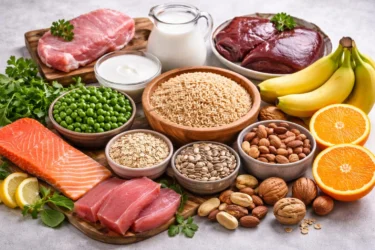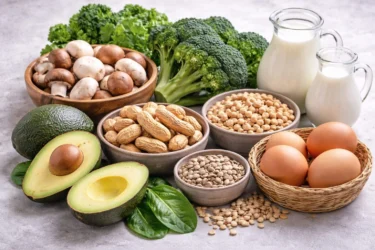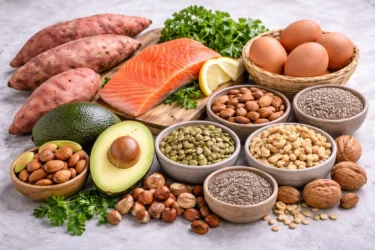A Complete Guide to Vitamins and Their Importance for the Human Body
By Dr. Malavika Athavale +2 more

Get,

to manage your symptom
Get your,


4 Cr+ families
benefitted

OTP sent to 9988776655



You’ve successfully subscribed to receive
doctor-approved tips on
Whatsapp

Get ready to feel your best.

Hi There,
Download the PharmEasy App now!!


Register to Avail the Offer
Send OTPBy continuing, you agree with our Privacy Policy and Terms and Conditions

Hi There,
Sign up on PharmEasy now!!
Trusted by 4 crore+ families

OTP sent to 9988776655



You have unlocked 25% off on medicines




Code: NU25

Comments


Leave your comment here
By Dr. Malavika Athavale +2 more
Table of Contents
When we discuss ways to improve our health, we mostly talk about lifestyle changes and the need to exercise regularly. Although these approaches can help transform your health, we often forget how important a special group of nutrients is. We are referring to vitamins!
Vitamins are absolutely crucial for growth and maintaining good health. They function like minerals, with the main difference being that minerals are inorganic matter that we source from the earth and water, while vitamins are organic compounds found naturally in plants and animals1.

The word ‘vitamin’ is derived from two Latin words, ‘vita’ (meaning ‘life’) and ‘amine’ (referring to ‘amino acids’). Fun fact: Initially, vitamins were incorrectly thought to be amino acids.
Vitamin H, more commonly known as biotin, is part of the B complex group of vitamins. Vitamin H is needed for healthy skin, hair, and nails. It also helps the nervous system function properly.
Dr. M.G. Kartheeka, MBBS, MD(Pediatrics)
There are 13 crucial vitamins, A, C, D, E, K, B1, B2, B3, B5, B6, B7, B9, and B12. They can be classified into two main types, as follows:
Let’s learn the food sources, functions, and deficiency symptoms of the 13 vitamins mentioned above.













There are two more compounds that resemble vitamins and function like them without being labelled as vitamins:
People may fall short of getting adequate amounts of all essential vitamins due to a combination of dietary, lifestyle, and individual health factors. These factors include:
In such situations, vitamin supplements may help support the body’s specific nutritional needs. However, you should consult a doctor before starting any vitamin supplements.
Vitamins B6, C and E along with micronutrients like zinc, selenium, iron and copper are important for maintaining a healthy immune system in an individual, repeated infections could be a warning sign of deficiency of these vitamins and micronutrients.
Dr. Ashish Bajaj, M.B.B.S., M.D. in Clinical Pharmacology and Toxicology
Taking multivitamins should always be done after consulting your doctor or nutritionist. Sometimes, vitamin supplements can cause side effects when consumed in excess or even if your body reacts adversely to the ingredients of a particular supplement. Constipation and stomach pain may occur initially (usually it resolves after a few days). Excess vitamin intake can also cause severe toxicity2. Read the ingredient list for any supplement you take to ensure that you are not allergic to anything in it. Also, if you have any pre-existing medical condition, you should inform your doctor before starting any new multivitamin supplement.
If you think you may be experiencing symptoms of vitamin deficiency and are wondering how to check vitamin levels, these tests may need to be done after consulting your doctor:
Identifying whether you have normal levels of vitamins is simple because your test results usually show columns for normal levels of vitamins and the levels in your system at the time of the test. This can help you identify if your vitamin levels are lower, higher or at par with the normal level.
For further clarity, you can ask your doctor to go over the reports.
Sometimes vitamin deficiency symptoms do not show up until very late, and a test can work like a preventive healthcare check. It will let you know which vitamin you need to supplement with. Therefore, it is important to check your vitamin levels whether you are taking supplements or not.
Similarly, even if you are taking vitamin supplements, vitamin level checks are just as important to ensure that there isn’t too much of a particular vitamin in your system as that may lead to toxicity.
The strategies for managing vitamin deficiencies are essentially the same:
Also Read: 5 Everyday Foods That Are Good for Brain Health!
Vitamins are vital for good health and proper functioning of the body, as they support growth, immunity, metabolism, and overall well-being. Maintaining a balanced diet rich in fruits, vegetables, whole grains, and protein sources along with healthy lifestyle habits can help avoid or manage most vitamin deficiencies. In some cases, regular monitoring of vitamin levels and taking vitamin supplements may be necessary. however, these steps should always be taken after consulting a doctor to avoid toxicity or side effects.
Also Read: Top Vitamin B12 Foods to Include in Your Diet Today!
Symptoms such as persistent fatigue, frequent infections, hair loss, brittle nails, muscle pain, or mood changes can be early warning signs of vitamin deficiencies. However, these symptoms alone aren’t reliable, and blood tests should be done to give a clearer picture of your health.
Taking multivitamin supplements without consulting your doctor may not be advisable. If you eat a well-balanced diet, supplementation may not be needed and could even cause toxicity over time, especially with fat-soluble vitamins like vitamins A, D, E, and K.
Vitamin D and vitamin B12 deficiencies are extremely common these days due to indoor lifestyles and dietary patterns. Folate and vitamin C deficiencies may also occur with poor dietary variety.
Whole foods provide fibre, antioxidants and multiple nutrients that work together for better absorption. Supplements should ideally fill gaps and not replace a healthy diet.
For generally healthy individuals, testing once a year is usually sufficient. People on supplements or with diagnosed deficiencies may need more frequent monitoring as advised by a doctor.
Disclaimer: The information provided here is for educational/awareness purposes only and is not intended to be a substitute for medical treatment by a healthcare professional and should not be relied upon to diagnose or treat any medical condition. The reader should consult a registered medical practitioner to determine the appropriateness of the information and before consuming any medication. PharmEasy does not provide any guarantee or warranty (express or implied) regarding the accuracy, adequacy, completeness, legality, reliability or usefulness of the information; and disclaims any liability arising thereof.
Links and product recommendations in the information provided here are advertisements of third-party products available on the website. PharmEasy does not make any representation on the accuracy or suitability of such products/services. Advertisements do not influence the editorial decisions or content. The information in this blog is subject to change without notice. The authors and administrators reserve the right to modify, add, or remove content without notification. It is your responsibility to review this disclaimer regularly for any changes.
Comments

Leave your comment...

View all comments(2)
You may also like
Thank you for helping me to gather all nutrition-related information
You are most welcome. Hope you found it useful.